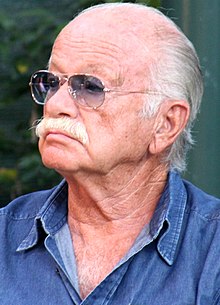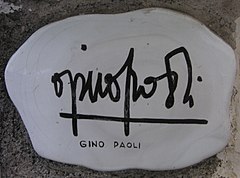Gino Paoli | |
|---|---|
 Paoli in 2010 | |
| Background information | |
| Born | 23 September 1934 Monfalcone, Italy |
| Genres | Pop |
| Occupation(s) |
|
| Instrument(s) | Vocals |
| Years active | 1959–present |
| Labels | |
| Website | ginopaoli.it |
Gino Paoli (Italian pronunciation: [ˈdʒiːno ˈpaːoli]; born 23 September 1934, in Monfalcone) is an Italian singer-songwriter. He is a seminal figure who has written a number of songs widely regarded as classics in Italian popular music, including: "Il cielo in una stanza", "Che cosa c'è", "Senza fine", "Quattro amici al bar" and "Sapore di sale".
Paoli was born in Monfalcone, a little town near Trieste, but moved to Genoa at a young age.
After several different jobs, he was signed to Dischi Ricordi with friends and fellow musicians Luigi Tenco and Bruno Lauzi. His first success was the single "La Gatta", which has been used in Italian language teaching classes in American middle schools and high schools.
"Il cielo in una stanza" was composed in 1959. According to Paoli, the lyrics came to him while lying on a brothel bed. Gazing at the purple ceiling, he thought, "Love can grow at any moment at any place".[1] Mina's single release of the song topped the list of annual sales in Italy[2] and reached Billboard Hot 100. Video performances of the song were included in the movies "Io bacio... tu baci" and "Appuntamento a Ischia". Later it was featured in the "Goodfellas" movie. Carla Bruni Sarkozy covered the song (mixing French with her native Italian) in her debut album ("Quelqu'un m'a dit").
Gino Paoli's debut album – Gino Paoli was released in Italy on 8 October 1961 on Dischi Ricordi.[3]
"Il cielo in una stanza" success was followed by "Sapore di sale" (1963), arranged by Ennio Morricone and believed to be his most famous song. In the same year he attempted suicide by shooting himself to the heart (the bullet is still inside his chest).
In 1974 he returned with the LP I semafori rossi non-sono Dio, followed by Il mio mestiere (1977). Both showed a more mature inspiration than his 1960s works. In the 1980s Paoli produced a series of successful albums, and in 1985 he toured Italy together with Ornella Vanoni.
In 1987 he was elected to the Italian Chamber of Deputies for the Italian Communist Party. He abandoned politics in 1992 to pursue his music ambitions.

He had a long relationship with actress Stefania Sandrelli. Their daughter, Amanda Sandrelli, is also an actress.
During an interview in February 2015, when the journalist cited a famous phrase of an Italian minister saying that taxes are a good thing, Gino Paoli insulted him.[4] At the time Paoli was under investigation for tax evasion, accused of having brought 2 million € of untaxed income to a Swiss bank.[5] The singer was acquitted in 2016 due to prescription of the crime.[6]
